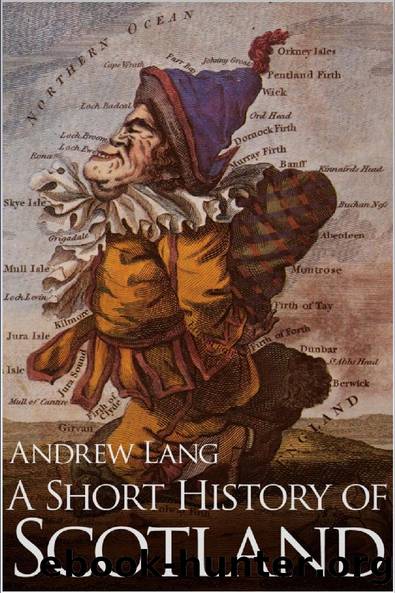A Short History of Scotland by Andrew Lang

Author:Andrew Lang
Language: eng
Format: epub
Tags: history, scotland, scottish, scot, scots, ancient, roman, romans, jacobite, rebellion
ISBN: 9781781667477
Publisher: Andrews UK Limited 2012
Published: 2012-06-19T00:00:00+00:00
CHAPTER XXIV. CHARLES I.
The reign of Charles I. opened with every sign of the tempests which were to follow. England and Scotland were both seething with religious fears and hatreds. Both parties in England, Puritans and Anglicans, could be satisfied with nothing less than complete domination. In England the extreme Puritans, with their yearning after the Genevan presbyterian discipline, had been threatening civil war even under Elizabeth. James had treated them with a high hand and a proud heart. Under Charles, wedded to a âJezebel,â a Catholic wife, Henrietta Maria, the Puritan hatred of such prelates as Laud expressed itself in threats of murder; while heavy fines and cruel mutilations were inflicted by the party in power. The Protestant panic, the fear of a violent restoration of Catholicism in Scotland, never slumbered. In Scotland Catholics were at this time bitterly persecuted, and believed that a presbyterian general massacre of them all was being organised. By the people the Anglican bishops and the prayer-book were as much detested as priests and the Mass. When Charles placed six prelates on his Privy Council, and recognised the Archbishop of St Andrews, Spottiswoode, as first in precedence among his subjects, the nobles were angry and jealous. Charles would not do away with the infatuated Articles of Perth. James, as he used to say, had âgoverned Scotland by the penâ through his Privy Council. Charles knew much less than James of the temper of the Scots, among whom he had never come since his infancy, and his Privy Council with six bishops was apt to be even more than commonly subservient.
In Scotland as in England the expenses of national defence were a cause of anger; and the mismanagement of military affairs by the kingâs favourite, Buckingham, increased the irritation. It was brought to a head in Scotland by the âAct of Revocation,â under which all Church lands and Crown lands bestowed since 1542 were to be restored to the Crown. This Act once more united in opposition the nobles and the preachers; since 1596 they had not been in harmony. In 1587, as we saw, James VI. had annexed much of the old ecclesiastical property to the Crown; but he had granted most of it to nobles and barons as âtemporal lordships.â Now, by Charles, the temporal lords who held such lands were menaced, the judges (âLords of Sessionâ) who would have defended their interests were removed from the Privy Council (March 1626), and, in August, the temporal lords remonstrated with the king through deputations.
In fact, they took little harm - redeeming their holdings at the rate of ten yearsâ purchase. The main result was that landowners were empowered to buy the tithes on their own lands from the multitude of âtitulars of tithesâ (1629) who had rapaciously and oppressively extorted these tenths of the harvest every year. The ministers had a safe provision at last, secured on the tithes, in Scotland styled âteinds,â but this did not reconcile most of them to bishops and to the Articles of Perth.
Download
This site does not store any files on its server. We only index and link to content provided by other sites. Please contact the content providers to delete copyright contents if any and email us, we'll remove relevant links or contents immediately.
Magic and Divination in Early Islam by Emilie Savage-Smith;(1533)
Papillon by Henry Charrière(1425)
Bohemians, Bootleggers, Flappers, and Swells: The Best of Early Vanity Fair by Bohemians Bootleggers Flappers & Swells- The Best of Early Vanity Fair (epub)(1394)
Ambition and Desire: The Dangerous Life of Josephine Bonaparte by Kate Williams(1383)
Twelve Caesars by Mary Beard(1313)
Operation Vengeance: The Astonishing Aerial Ambush That Changed World War II by Dan Hampton(1155)
What Really Happened: The Death of Hitler by Robert J. Hutchinson(1154)
London in the Twentieth Century by Jerry White(1145)
The Japanese by Christopher Harding(1130)
Time of the Magicians by Wolfram Eilenberger(1125)
Twilight of the Gods by Ian W. Toll(1117)
Lenin: A Biography by Robert Service(1074)
The Devil You Know by Charles M. Blow(1024)
A Social History of the Media by Peter Burke & Peter Burke(968)
Freemasons for Dummies by Hodapp Christopher;(964)
Napolean Hill Collection by Napoleon Hill(939)
Henry III by David Carpenter;(919)
The Rise and Triumph of the Modern Self by Unknown(912)
Richard III (The English Monarchs Series) by Charles Ross(906)
